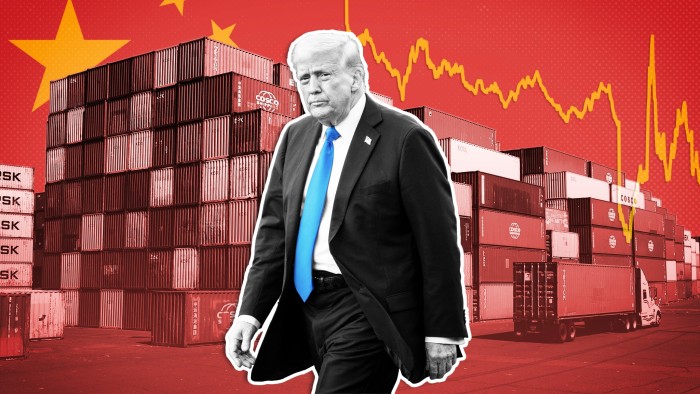Donald Trump on Wednesday announced a 90-day pause to the sweeping tariffs he unleashed on all major US trading partners last week, triggering immediate relief on Wall Street as he backed down from a policy that threatened to upend global trade.
At the same time, Trump boosted tariffs on China to 125 per cent, doubling down on his trade war with the world’s second-largest economy.
The pause on Trump’s so-called reciprocal tariff scheme is the latest in a series of U-turns and reversals made by the US president in the chaotic trade policy rollout since his inauguration in January.
Why did Trump pause the tariffs?
The breadth and size of US tariffs on its major trading partners triggered a global sell-off in equities and attracted rare criticism of Trump from Republican lawmakers on Capitol Hill. Multiple billionaire financiers also slammed the levies, including some of the Republican party’s biggest backers.
Explaining his decision on Wednesday, Trump referred to the global market rout, which had extended to a sell-off in US Treasuries, and said people were getting “yippy”. “You have to have flexibility,” Trump told reporters.
His decision broke as his top trade negotiator, Jamieson Greer, was giving testimony to lawmakers on Capitol Hill. “WTF, who’s in charge?” Steven Horsford, the Democratic lawmaker from Nevada, shouted at Greer moments after Trump announced the pause. “The president of the United States is in charge,” Greer replied.
Which tariffs are left?
The US now has a 10 per cent baseline tariff on imports from all countries, including the EU, with exemptions for chips, copper, lumber, pharmaceuticals, bullion, energy and minerals not found in the US.
Autos and auto parts also dodged the 10 per cent levy — but they remain subject to a separate 25 per cent tariff introduced by Trump last month.
Recommended
Mexico and Canada had avoided the worst of the reciprocal tariff regime, but Washington last month applied tariffs of 25 per cent to all imports from its two neighbours that did not abide by the terms of their 2020 free-trade deal, the USMCA.
The White House confirmed on Wednesday that the 25 per cent tariff would remain in place.
Levies of 25 per cent on all steel and aluminium imports into the US will stay, and probes that could lead to tariffs on copper and lumber are continuing.
The president may also follow through on his pledges to introduce tariffs on chips and pharmaceuticals.
Will the ‘reciprocal’ tariffs return?
Trump said that more than 70 countries were queueing up to strike agreements with Washington.
To avoid a scenario in which the levies reappear in 90 days, the White House will be looking to rapidly cut deals on the paused “reciprocal” tariffs, including on manufacturing-intensive countries such as Japan, South Korea, Vietnam and Cambodia.
Former UK trade department official Allie Renison, now at consultancy SEC Newgate, said that given the challenge of running so many negotiations concurrently, a faster climbdown would be to shift from blanket tariffs to more targeted, sectoral duties and product exemptions.
“Trump could move away from imposing blanket country-by-country tariffs to a system based on product-specific duties, which could be more manageable for manufacturers and target unfair trade barriers on particular products,” she added.
Why did Trump not reduce tariffs on China?
Trump raised the levies on China from 104 per cent to 125 per cent, even as he reduced them on other countries. The move came after Beijing unleashed retaliatory duties on the US earlier on Wednesday in response to an earlier increase by Washington.
Treasury secretary Scott Bessent blamed China for the retaliatory tariffs. “As I told everyone a week ago in this very spot, ‘Do not retaliate, and you will be rewarded’,” he said on Wednesday.
While many countries have approached the White House to hold trade talks, the US and China have had no negotiations.
The president said he did not anticipate further increases to the tariff rate on China, adding that he expected the two countries would at some point reach an agreement.
But Beijing has told the Trump administration that it views the tariffs as a bullying tactic and that it will not be cowed by the US president’s actions.
While Trump has suggested that President Xi Jinping will agree to talk to him at some point, the Chinese leader is unlikely to agree to a call — let alone a meeting — unless officials have first hammered out the contours of a deal that would make discussions more politically feasible for Xi at home.
Is the global trade war over?
Economists warn that the upheaval already created by Trump’s belligerent approach to tariffs will have negative impacts as a result of the uncertainty and distrust that hangs over US trade relations.
Recommended
Nicolò Tamberi, of the Centre for Inclusive Trade Policy at the University of Sussex in the UK, said uncertainty deterred investment as corporations adopted a wait-and-see policy before deciding how to adjust their supply chains.
“The [academic] literature suggests the effects of uncertainty can be as bad as tariffs, and there is a massive amount of uncertainty here. So even if Trump does deals to avoid tariffs’ impacts today, maybe he will change his mind tomorrow,” he said.
Market investors may also adopt a wait-and-see strategy before assuming the turmoil has ended.
Steven Abrahams, head of investment strategy at Santander US Capital Markets, cautioned that without more clarity, investors might decide to hang back for the next 90 days instead of jumping back into the market.
“We’ve seen ‘liberation day’ one. Without clarity, some may invest despite the possibility of ‘liberation day’ two, but many will not,” he said.
Additional reporting by Will Schmitt in New York




